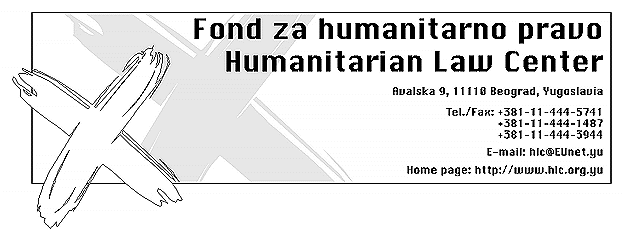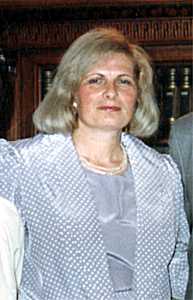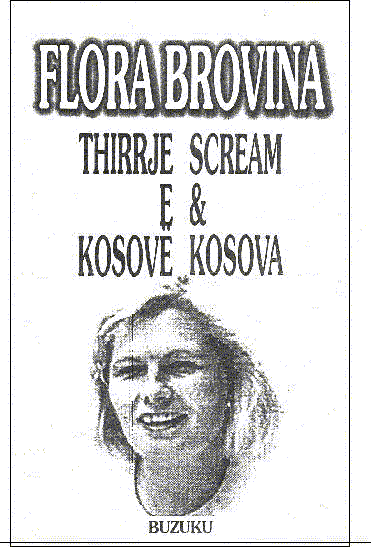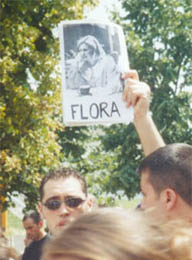Betreff:
AI statement on Brovina trial
Datum:
Sun, 14 Nov 1999 15:21:29 -0500
Von:
Gay Gardner <ggardner@igc.org>
FYI, public statement issued Nov. 10--
AI INDEX: EUR 70/122/99
News
Service 211/99
PUBLIC STATEMENT
Federal Republic of Yugoslavia (FRY): Dr Flora
Brovina faces unfair trial
Amnesty International is concerned that tomorrow’s
trial of Dr Flora Brovina, an Albanian physician from Priština, will not
meet international standards of justice and that Dr Brovina, as well as
some other 2000 ethnic Albanians from Kosovo detained in Serbia on charges
of terrorism, will not receive a fair trial. Dr Brovina has reportedly
been denied the opportunity of confidential meetings with her lawyer, in
contravention of international human rights standards on fair trial. She
is also said to be in poor health, suffering from angina.
Charges against Dr Brovina, when investigations
opened, included “association for the purpose of hostile activity”, “damaging
the territorial integrity of the FRY” and “terrorism”. Dr Brovina was a
founder of the League of Albanian Women in Kosovo and is accused of assisting
in the manufacture and supply of uniforms and other material for the Kosovo
Liberation Army (KLA), the main ethnic Albanian armed opposition group.
Although Dr Brovina has, like many Kosovo Albanians,
been reported as “sympathising with” the KLA, she has denied any involvement
with the organization. Amnesty International is not aware of any
statements she has made advocating the use of violence, or of any evidence
of her direct involvement in violent acts.
Serbian police arrested Dr Brovina on 22 April
1999, but information as to her whereabouts was not provided until June,
when her family was told she was detained in Pozarevac prison in Serbia.
However, during the period in which her family feared that she had "disappeared",
ethnic Albanian prisoners released from Lipljan prison, informed them that
Dr Brovina had been held with them.
Amnesty International is calling upon the Yugoslav
authorities to ensure full respect for Dr Brovina’s rights, in particular
her right to an adequate defence in a trial which meets international standards.
ENDS.../
******************************************************************************
For more information please call Amnesty International's
press office in London, UK, on 44 171 413 5566 or visit our website
at http://www.amnesty.org
_______________________________________________________________________
Betreff:
IWPR'S BALKAN CRISIS REPORT, NO. 92
Datum:
Sat, 13 Nov 1999 23:23:22 +0000
Von:
Institute for War & Peace Reporting <info@iwpr.net>
WELCOME TO IWPR'S BALKAN CRISIS
REPORT, NO. 92, November 12, 1999
SERBIAN JUSTICE ON TRIAL
The prosecution of a Kosovo Albanian human rights
activist on terrorism charges has exposed serious gaps in the rule of law
in Serbia.
By Laura Rozen in Nis
Flora Brovina, a paediatrician, poet and human
rights activist from Pristina, appeared in court in Nis, Serbia, November
11, to face charges of "conspiring to commit hostile acts" and terrorism.
There has been considerable
concern that Dr. Brovina, one of the most prominent Kosovo Albanians in
Serb custody, will be denied a fair trial by the Serbian authorities.
One incident at the
end of the day's court proceedings added credence to these concerns.
According to one international
observer, who wishes to remain anonymous, Brovina's husband, Ajri Begu,
asked the judge if he could speak to his wife as she was led away.
One of the judges said,
"Go right ahead." But when Begu approached his wife, the police taking
Brovina out of the room said he was not allowed to speak with her. Legally
the police do not have the right to tell a court what to do, but in this
instance their arbitrary decision went unchallenged.
"It was obvious which
was more powerful: a court decision or police instructions," said Nikola
Barovic, a Belgrade attorney and legal advisor to the UN High Commissioner
for Human Rights (UNHCHR). "The police are stronger than the court. The
police said no and it was no, who cares for the judge. That frightens me."
Barovic has voiced fear
that the rule of law in Serbia is disintegrating. Cases of people convicted
and sentenced to long jail terms on the basis of little or no evidence
are on the increase, as are incidents of police ignoring or failing to
implement court rulings.
Brovina, 50, was arrested
on April 20 in Pristina and later transferred to Pozarevac. She had been
working for several months at a clinic for internally displaced refugees.
"The whole indictment
is based on items confiscated from Dr. Brovina's medical clinic," explained
Radovan Dedijer, a lawyer with the Humanitarian Law Centre in Belgrade.
"The 'crucial evidence'
is some medicines they have taken from her office, a photo of Dr. Brovina
with a member of the KLA [Kosovo Liberation Army], and wool donated by
the British charity Oxfam, which the refugee women were using to knit sweaters.
She is accused of making the sweaters for the KLA," he says.
One of Brovina's two
defense lawyers, Husnije Bytyqi, an Albanian from Belgrade, requested the
trial be postponed as he had yet to receive a copy of the indictment against
Brovina. His request was denied.
Brovina, who is reported
to have suffered a stroke while in police custody, appeared dishevelled
but otherwise well. She was escorted into the dock in handcuffs by three
large security guards.
In her defense statement
Brovina said her clinic was properly registered and was providing medical
help "to children and women who were mostly refugees who had fled to Pristina".
She said she was not a member of the self styled 'Kosovar government',
but a member of a council on the emergency situation in Kosovo, in the
capacity of medical adviser.
If convicted Brovina
faces a prison term of between one and 10 years.
Human rights groups
are eager to ensure that the fate of Kosovo Albanian prisoners less well
known than Brovina are paid due attention. At least 1,900 Kosovo Albanians
are known to be in Serbian custody.
The UNHCHR has called
for the immediate release of four vulnerable groups of prisoners: women,
minors, the elderly, and the sick.
Lawyers with the Humanitarian
Law Centre found a five-month-old baby on one visit to prisoners in Pozarevac.
The baby's mother, Igbale Xhafaj, 20, from Urosevac, gave birth in her
prison cell in May.
Serbian authorities
have confirmed that there are currently 12 Kosovo Albanian women and 25
minors in Pozarevac prison. Aside from the baby, the youngest prisoner
is Sabri Muzliu, 5, from Strubllove, a village near Glogovac, who is being
held along with her sibling Shemsi, 14.
Another concern for
human rights groups is the lack of transparency in the Serbian prison system.
Lawyers complain prison authorities simply deny an individual is in their
custody and refuse to provide information on their whereabouts or well
being. There is some evidence that deaths in custody often go unreported.
Rumours abound of families
buying the release of relatives and of prisoners being murdered in custody.
Now stories are surfacing
of private prisons run by ethnic Albanians in Kosovo where missing Serbs
may be being detained.
On November 3, the Belgrade
newspaper Danas reported claims by the owner of a private detective agency
in Kragujevac that the father of an ethnic Albanian had approached him
to search for his missing son.
According to the news
story, the father offered to pay $20,000 or to arrange a prisoner exchange.
The father allegedly offered to secure the release of 10 kidnapped Kosovo
Serbs.
The father claimed he
knew of two private prisons - one in an old brick factory in the village
of Poljance, 12 km outside Srbica in central Drenica, the other in the
village of Tuslija, above Devic monastery. The report claimed the Serbian
prisoners were hidden from KFOR forces in the mines.
Barbara Davis of the
UNHCHR says the commission is investigating these reports, but they are
as yet unconfirmed. KFOR has already shut down two KLA-run private prisons
in the cities of Prizren and Gnjilane.
Davis' commission is
trying to compile a comprehensive list of all detained people, of all ethnic
communities, and to identify those considered vulnerable in order to press
for their immediate release.
"It's not just peoples'
lives that are being ruined in these trials," says Davis. "It's the entire
state of rule of law. And whether or not there can be rule of law and respect
for the rule of law is at stake."
The conviction of Kosovo
prisoners on the basis of no evidence, as well as the growing number of
arrests of Serbian pro-democracy activists on no legitimate charges, has
convinced some human rights activists that there can be no rule of law
in Serbia without major political change.
"Elections on the republic
level is the only way to stop this chaos," Barovic, the lawyer, added.
"Only with a change of government will there be a chance to reform Serbia's
legal system."
Brovina's trial is scheduled
to resume on November 25.
Laura Rozen, a regular contributor to IWPR, is
a journalist specialising on the Balkans.
_______________________________________________________________________
Betreff: HLC
Statement
Datum:
Fri, 12 Nov 1999 20:32:54 +0100
Von:
Humanitarian Law Center <hlc@EUnet.yu>

HUMANITARIAN LAW CENTER COMMUNIQUE
NO VALID EVIDENCE AGAINST FLORA
BROVINA
12 November 1999
The Humanitarian Law Center considers that the
evidence presented at the trial of Dr Flora Brovini at the District Court
in Nis is far from conclusive. Dr Brovini, chair of the League of
Albanian Women in Kosovo, is charged with conspiracy for the purpose of
hostile activity and terrorism.
The prosecution’s case against Dr Brovini is
based exclusively on a receipt for a quantity of knitting wool, medicines
and medial supplies, and a photograph showing Dr Brovini with a member
of the Kosovo Liberation Army that were allegedly found in her possession.
At the trial, Dr Brovini denied all counts of the indictment. She said
the League of Albanian Women was a legally registered peace organization
which provided relief aid to women and children from war-affected areas.
She added that the materials found on the League’s premises were received
from domestic and foreign humanitarian organizations, and that customs
documentation exists to prove this.
The trial was adjourned until 25 November when
the court is to hear the testimony of a witness, Dr Dobrasin Krdzic, in
order to determine the quantity and kind of medical supplies found at the
League’s offices. Since the defense does not deny this fact, the
proceedings are thus being unnecessarily prolonged. As a result, Dr Brovini,
who suffers from a serious heart condition, will remain in custody. She
was arrested on 10 April this year.
_______________________________________________________________________
Betreff:
NYT: In Courtroom, Kosovo Doctor Denies Charge of Terrorism
Datum:
Fri, 12 Nov 1999 11:45:14 -0500
NY TIMES
November 12, 1999
In Courtroom, Kosovo Doctor Denies Charge of
Terrorism
By CARLOTTA GALL
NIS, Serbia -- The most prominent Kosovo Albanian
in Serbian custody went on trial here Thursday, facing charges of terrorism
and separatism.
Dr. Flora Brovina, 50,
a physician and founder of the League of Albanian Women in Kosovo,
was arrested last spring during the NATO bombing campaign against Yugoslavia.
During the court session Thursday, she rejected the prosecution's accusations
that she assisted rebels who fought for Kosovo's independence.
"I do not accept that
I was a terrorist against the state," she said. "What was my mistake?
That I did not ask the nationality of the children that I helped?
I will help anyone, any time, any way I can."
After three hours, the
court was adjourned for two weeks to allow the prosecution to call a witness
from the neighboring province of Montenegro. The trial will resume Nov.
25.
Dr. Brovina, who said
she had heart problems, appeared pale and tired. But she spoke for
some 30 minutes in her own defense, pleading to be regarded as a medical
professional and not as a political activist.
Dr. Brovina, one of
about 2,000 ethnic Albanians detained during Belgrade's yearlong attempt
to suppress rebellion in Kosovo, was arrested on April 20 in Pristina,
Kosovo's capital, a month after the start of the NATO campaign. In
June, as Yugoslav authorities withdrew and NATO forces prepared to take
control, she and other prisoners were transferred out of Kosovo to jails
elsewhere in Serbia.
She has been charged
under two articles of the Yugoslav criminal code, with terrorism
and conspiring to perform hostile acts. As founder of the League
of Albanian Women, she was accused of supporting the separation of Kosovo
from Yugoslavia and "helping terrorist gangs of the Kosovo Liberation
Army."
The prosecution says
that she organized several political demonstrations and provided
medicine, clothing and other assistance to the rebels. Prosecutors also
said that, as minister of health in Kosovo's Albanian shadow government,
she helped plan terrorist activity.
"What is in that indictment
is not me," Dr. Brovina said in court Thursday. "The only thing I
accept is that I and some friends formed the League of Albanian Women.
It is an independent organization and is not interested in organizing
demonstrations, separatism or military affairs. It is just like any
other women's organization."
She also denied that
she was health minister in the shadow government, and said that she
was in charge of medical issues for the women's .
She explained her efforts
to help Kosovo's Albanian women, saying, "They are the worst-treated citizens
of Yugoslavia and suffer a poor education, a high birthrate and frequently
have to give birth without medical assistance."
She denied any involvement
with the Kosovo Liberation Army, and said no one in her family was involved
with the rebels or in any political party. Her husband, Ajri Beku,
is an economist and banker, and her two sons are students, one in Texas.
She said she had demonstrated only in the name of peace.
"If you are antiwar,
you cannot be a terrorist," she told the judge.
Western governments
and human rights organizations have voiced concern about Dr. Brovina's
case. This week, the State Department spokesman, James P. Rubin, said he
doubted she would receive a fair trial.
"We want to express
our concern over the apparent abuse of the legal system in this case and
others, and condemn Serbia's actions as a continued demonstration of Serbia's
disregard for international norms of behavior," Rubin said.
Barbara Davis, a representative
of the United Nations Commission on Human Rights in Belgrade, was present
at the court session today, and said she had raised the issue recently
with Serbia's health and justice ministers.
A Serbian lawyer advising
the United Nations commission, Nikola Barovic, said he was not dissatisfied
by the court proceedings, but said he had not seen any evidence so
far to support the charges against Dr. Brovina. The terrorism charge
carries a sentence of up to 20 years.
Dr. Brovina's lawyer,
Zika Zokanovic, a Serb originally from Kosovo, agreed that the trial was
fair but he protested strongly at the postponement, suggesting it was a
delaying tactic of the prosecution.
Natasa Kandic of the
Humanitarian Law Center, based in Belgrade and Pristina, said hundreds
of Kosovo Albanians had been tried in Serbia in recent months, and
that most had been convicted.
"Probably the Serbian
authorities decided to organize trials and keep Albanians in prison because
they think it is a manifestation of Serbian sovereignty," she said.
"It is important for them to show they have power and that Kosovo
is part of Yugoslavia."
_______________________________________________________________________
http://www.nytimes.com/yr/mo/day/letters/l18ser.html
November 18, 1999
Harassment in Kosovo
Related Articles: In Courtroom, Kosovo Doctor
Denies Charge of Terrorism (Nov. 12, 1999)
To the Editor:
The prosecution of Dr. Flora Brovina by Serbian
authorities for providing medical care to members of the Kosovo Liberation
Army is part of a long campaign to harass and intimidate Kosovar Albanian
doctors in violation of international law (news article, Nov. 12).
For months before the NATO bombing, Physicians
for Human Rights investigated and reported on arrests, prosecutions and
killings of Kosovar Albanian doctors who were upholding their professional
obligations to provide medical treatment to sick and wounded civilians
and combatants outside of combat, all duties protected by the Geneva Conventions.
The attacks against the Kosovars were the most systematic and targeted
attacks on health workers we ever documented, and appeared to be intended
to undermine the health care infrastructure of the Kosovar Albanians.
LEONARD RUBENSTEIN
Executive Director Physicians for Human Rights
Boston, Nov. 15, 1999
Copyright 1999 The New York Times Company
_______________________________________________________________________
http://news2.thls.bbc.co.uk/hi/english/world/europe/newsid_515000/515267.stm
Thursday, November 11, 1999 Published at 14:43
GMT
World: Europe
Prominent Kosovo Albanian's
trial postponed
The trial in Serbia of a prominent Kosovo Albanian
human rights activist, Flora Brovina, has been postponed on the request
of the prosecution until later this month November 25th.
Dr Brovina, who founded
the League of Albanian Women, appeared in court in the southern city of
Nis on charges of terrorism and assisting the Kosovo Liberation Army.
She denied the accusations,
saying that her organisation had purely medical and humanitarian aim.
United Nations officials
and human rights activists monitoring the trial described it as purely
political. They said they had seen no evidence to convict Dr Brovina. Her
lawyer said the postponement of the trial was a tactic to try to divert
international interest in it.
From the newsroom of the BBC World Service
_______________________________________________________________________
http://sg.dailynews.yahoo.com/headlines/world/afp/article.html?s=singapore/headlines/991111/world/afp/Kosovo_human_rights_activist_is_tried_in_Serbia.html
Thursday, November 11 11:51 PM SGT
Kosovo human rights
activist is tried in Serbia
NIS, Yugoslavia, Nov 11 (AFP) -
A Kosovo Albanian human rights activist on Thursday
denied charges of "terrorism" at the start of a trial condemned by the
United States as an abuse of justice.
Flora Brovina, a 50-year-old
pediatrician, is charged with joining groups "with a view to terrorist
activities," aimed at achieving the "secession of Kosovo" from Serbia and
Yugoslavia, according to Serb authorities.
If found guilty, she
could be jailed for up to 15 years, her lawyer Zivojin Jokanovic told AFP,
after the trial, held in the southern Serbian town Nis, was adjourned until
November 25 after a prosecution witness failed to show up.
In court Brovina denied
the charges of "terrorism," saying she considered herself a "great humanist,"
who "has done nothing wrong... just helping children."
Wearing a sweater, slacks
and shoes without laces, Brovina spoke calmly in Serbian, refusing an Albanian
translator.
But she burst in tears
as she insisted: "Even if I were not Albanian, I would do the same. And
as Albanian, I would help Serbs who have fled Kosovo because it is my job."
Brovina is also accused
of providing food and help to members of the Kosovo Liberation Army (KLA),
considered a terrorist organisation by Belgrade.
In September, the KLA
was officially transformed into a civilian protection corps under the auspices
of the United Nations.
"I don't know anybody
from the KLA. None from my family was a member of the KLA," she said denying
the charge.
"I am and I will remain
against war," she added.
Barbara Davis, head
of the UN human rights office in Belgrade, was present at the trial as
well as representatives of non-governmental human rights group, the Humanitarian
Law center.
Ajri Begu, Brovina's
husband, who was also present, told AFP he considered the trial "political."
Brovina, a poet and
founder of the League of Albanian Women, was arrested April 20 at her home
in Kosovo's provincial capital, as NATO forces launched air strikes against
Yugoslavia.
The trial has been condemned
by the United States, and various human rights groups as the Amnesty International
and Human Rights Watch.
US State Department
spokesman James Rubin said Wednesday that Washingron was concerned "over
the apparent abuse of the legal system in this case."
"As far as we can tell,
the only thing she has done is to provide pediatric and medical services
to women and children in Pristina during the (Kosovo) conflict."
Rubin said Washington
was deeply concerned about the fate of others who were "languishing" in
Serbian prisons, regardless of their ethnic origins.
Serbian Justice Minister
Dragoljub Jankovic said recently that some 2,050 Kosovo prisoners, mainly
ethnic Albanians, were detained in Serbia, many of them accused of being
members of the KLA.
Copyright © 1999 AFP
|




